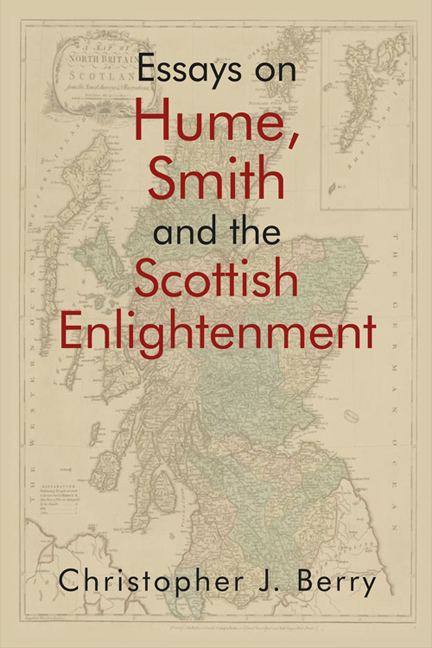18 - Adam Smith: Commerce, Liberty and Modernity
Published online by Cambridge University Press: 06 May 2021
Summary
Adam Smith, in his lectures at the University of Glasgow, is reported to have professed that ‘opulence and freedom’ were ‘the two greatest blessings men can possess’ (LJA iii.111/185). Smith here couples together what many have held asunder as contraries. One such thinker, with whose thought Smith was well acquainted, was Rousseau. He reviewed Rousseau's Discourse on Inequality for the second edition of the short-lived Edinburgh Review of 1755/6 and, as was characteristic of eighteenth-century reviews, Smith's account contained lengthy quotations. The first passage that Smith thought worthy of reproduction begins:
while men contented themselves with their first rustic habitations; while their industry had no object, except to pin together the skins of wild beasts for their original cloathing, to adorn themselves with feathers and shells [etc.] … while they applied themselves to such works as a single person could execute, and to such arts as required not the concurrence of several hands; they lived free, healthful, humane and happy, as far as their nature would permit them, and continued to enjoy amongst themselves the sweets of an independent society …
The second passage contains the judgement that
man, from being free and independent, became by a multitude of new necessities subjected in a manner, to all nature, and above all to his fellow creatures, whose slave he is in one sense even while he becomes their master; rich he has occasion for their services; poor he stands in need of their assistance; and even mediocrity does not enable him to live without them. He is obliged therefore to endeavour to interest them in his situation, and to make them find either in reality or in appearance, their advantage in labouring for his. (Letter 13–14/251–2)
Smith is aware that, despite the presence here of what he terms ‘rhetoric’, Rousseau represents a persistent and important strand in European political thinking. This strand, frequently referred to as civic humanism, linked the ideas of freedom and independence and identified threats to the latter as inimical to the former. The essence of civic humanism, as outlined by John Pocock – the writer who has done most to bring out the presence of this tradition in European thought – lay in the link between virtue and the practice of citizenship as understood by the Greeks and Romans.
- Type
- Chapter
- Information
- Essays on Hume, Smith and the Scottish Enlightenment , pp. 326 - 346Publisher: Edinburgh University PressPrint publication year: 2018

